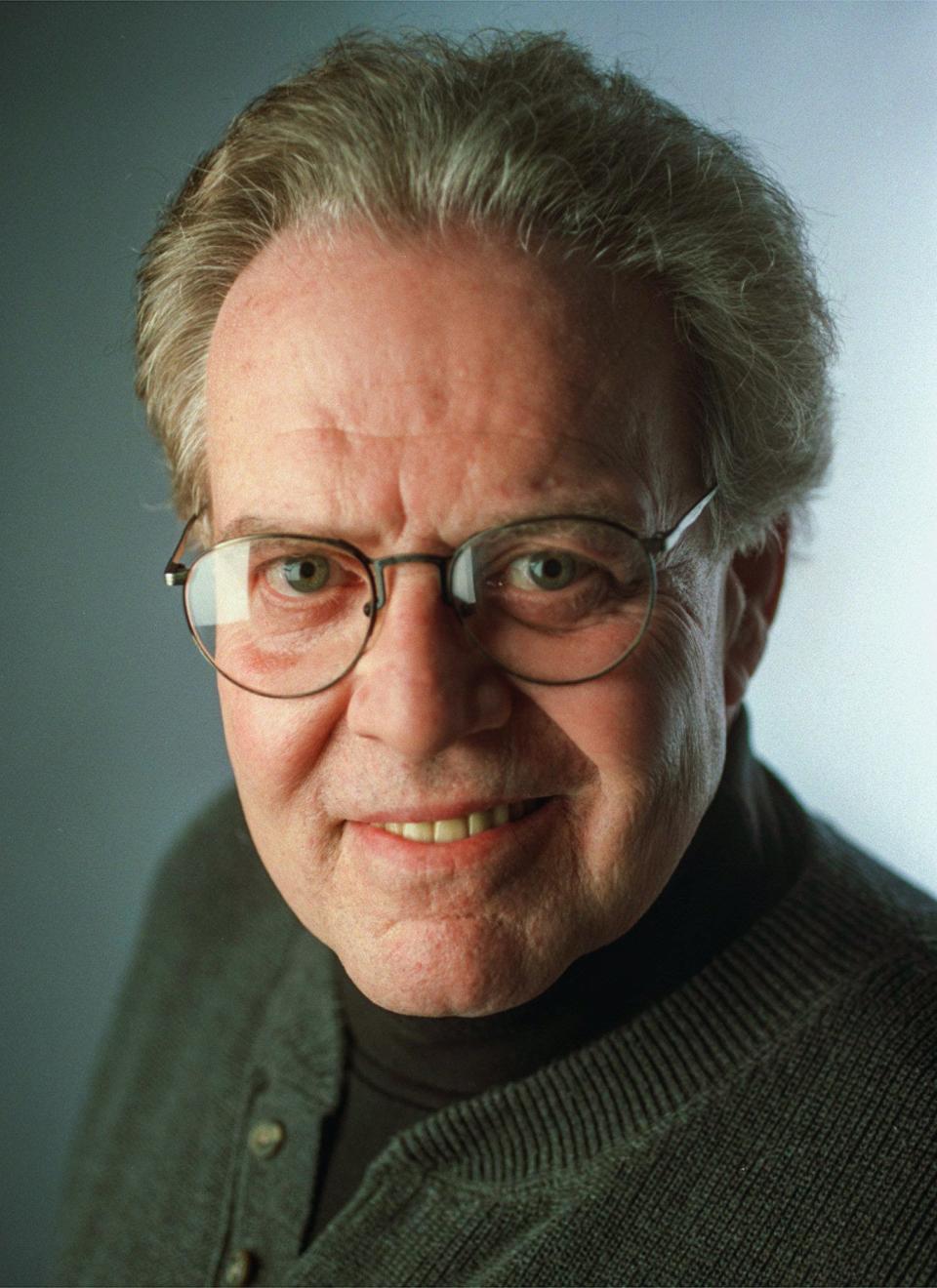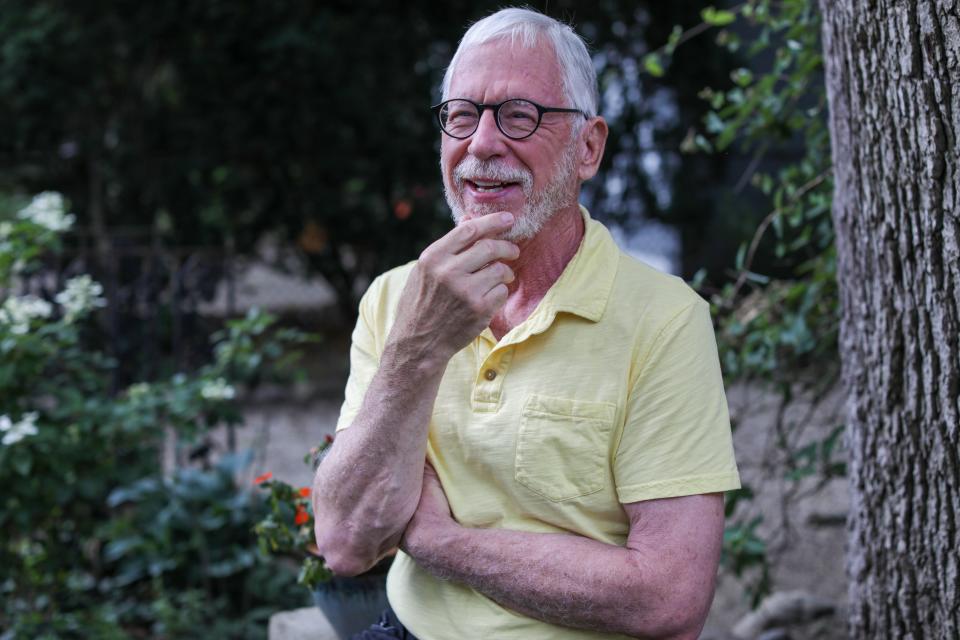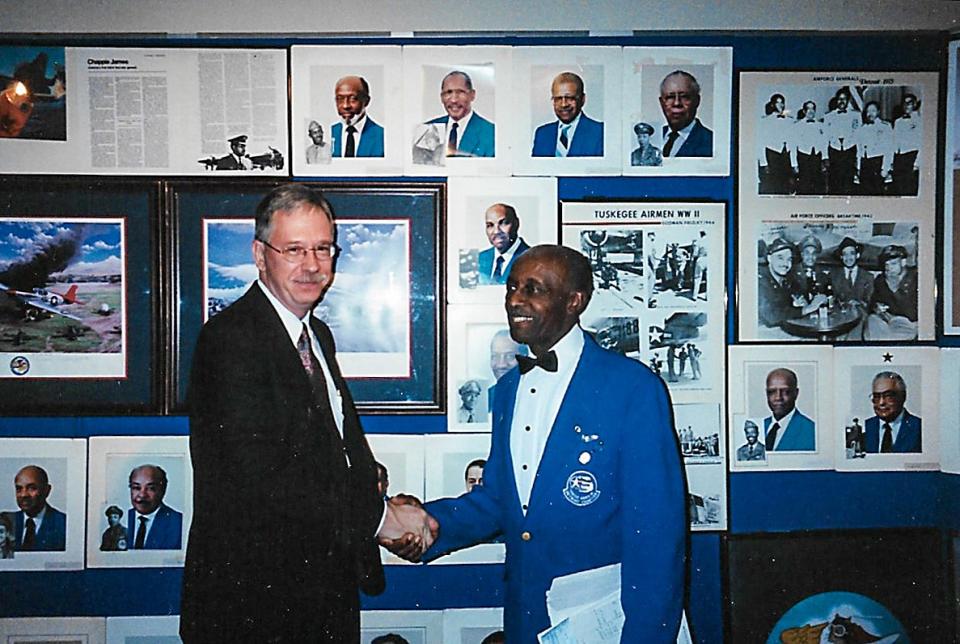Neal Rubin: After 24 years, lessons from a teacher, a Tuskegee Airman — and Bob Talbert
We tried to write about Nelson Maylone and Richard Macon 24 years ago, to tell Macon's astonishing story and remind everyone about the impact a great teacher can have on someone's life.
The Free Press' most popular columnist interviewed them both: Macon, the Tuskegee Airman and authentic World War II hero, and Maylone, the student he so inspired that he became an inspiring teacher himself.
Then Bob Talbert died, and if you remember the name, you remember the shock.

"He called on a Sunday," Maylone remembered, "and we talked for an hour."
It was August 1999, and it was Talbert at his best, friendly and engaging and truly curious. But a few days later he was admitted to the hospital for triple bypass surgery and a valve replacement, and he was still there in mid-November when a burst duodenal ulcer and a plague of other complications put an end to 31 years at the keyboard in Detroit.
It's a peculiar distinction, but Maylone may have been Talbert's last interview.
A generation later, cleaning out his home office in Royal Oak as he packs for a move to Rochester, he found himself thinking about Macon, the first Black teacher he'd had in the Detroit school system and the model for his own career.
Maylone dropped a note to say that even if we didn't want to pick up where Talbert left off, it felt good to lift the former pilot in praise.
Capt. Macon couldn't hear it; he died at 86 in 2007. But most everyone had a teacher who deserves special thanks, and ideally, a salute to one of them invokes warm thoughts about them all.
Learning in and out of class
Maylone, 72, retired two years ago from Eastern Michigan University, where he earned his Ph.D. and taught future teachers for 20 years to appreciative reviews.

Before that, he was an administrator in Brighton and Grosse Pointe, and before that he taught middle school math and coached track and field for 17 years.
One of his students at Abbott Middle School in West Bloomfield, dumped into his class as a problem child, thanked him at the end of the year with a caricature of Maylone at the blackboard that hung on his office wall throughout his decades at EMU.
Another, he said, saddled with a snippy nickname by other kids but pointedly supported by Maylone, chose a career path he couldn't help but take as a compliment: math teacher and track coach at Abbott.
All of that leads back to Macon.
"As a former math teacher," Maylone said, "I'd put the probability of Dick Macon's influence at 50%," and even if it wasn't Macon who shaped his resume, Macon was his benchmark for how to teach.
They intersected on the east side, where Maylone grew up near Hoover Street and Seven Mile Road. His parents owned a tavern called the Impulse Bar, and his neighbors in the early 1960s were still overwhelmingly white.

A Black teacher was a novelty at first at Von Steuben Junior High, Maylone said, and then quickly a revelation. As a 13- and 14-year-old, "He left me reevaluating my view of people who didn't look like me."
Equally impactful, Macon left him appreciating mathematics and studying what made an effective teacher.
"He was strict, but in a fair way," Maylone said, and had a painless sense of humor. "He made it so fun, you barely knew you were in school."
Macon sponsored after-school dance parties for math students. The kids would quote him to one another — "Fractions are your friends!" — and they met his wife.
They knew he'd been a pilot, but it rarely occurred to them to ask for details.
"Even in 1965," Maylone said, only 20 years after victory, "World War II was ancient history to us."
More from Neal Rubin Southfield cancer survivor's hand-crafted birdhouses are attracting out-of-state buyers
Michigan man with pancreatic cancer and 10,000 snakes races to finish aquarium
Making appreciation official
The most harrowing moments of his service, Macon didn't recall.
The Tuskegee Airmen were the pilots and support personnel of the U.S. Army Air Forces' 332nd Fighter Group and 477th Bombardment Group, the only Black units to fly in the segregated military.
Macon, a college graduate from Alabama approaching his 23rd birthday, was escorting bombers on a run to Toulon, France, in August 1944 when his P-51 Mustang fighter was riddled by German flak.
The plane inverted and caught fire. Struggling to regain control, he passed out and slumped against the control stick, sending the Mustang into a loop and flinging him from the cockpit. Serendipitously, his parachute deployed, and he awoke 45 minutes later with a broken neck and shoulder and a welcoming party of three German soldiers staring down at him.
He spent the rest of the war in POW camps, then came home to a country that wouldn't let him work as a commercial pilot. He opened a flight school, ventured to Indiana University for a master's degree, and ultimately moved to Detroit, where he taught or served as an administrator from 1956 to '87.
The former aviator "helped us navigate adolescence," Maylone said. He was calm and steady, with an innate understanding of when to talk and when to listen, and "he was just the coolest guy. I don't know if he knew he was a role model, but he was."
Maylone dropped by his office in the early 1980s to tell him so. Then, in 1998, he put it in writing.

He wrote a book, a collection of counterintuitive math and logic problems for middle graders called "That Can't Be Right."
Over dinner, he showed Macon what he'd accomplished and then turned to the dedication, right there in black and white: to Dick Macon and another influential instructor, "who affected more lives than they could have known."
Macon wept, and of course, so did Maylone.
Great teachers can have that effect. Great students, too.
Neal Rubin was blessed with any number of stellar teachers who deserved better students than he. Reach him at NARubin@freepress.com, and feel free to track him on Twitter at @nealrubin_fp.
To subscribe to the Free Press at unfailingly attractive rates, click here.
This article originally appeared on Detroit Free Press: Bob Talbert died before writing story on Tuskegee Airman Bob Talbert

